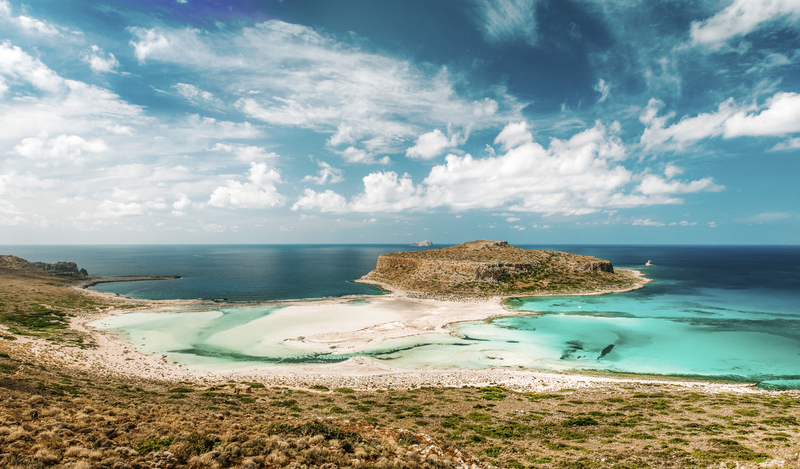Discover Greece: A Timeless Haven for Your Retirement
Greece, a country known for its stunning landscapes, rich cultural heritage, and welcoming community, is an ideal destination for retirees seeking a comfortable and fulfilling lifestyle. From the bustling streets of Athens to the serene islands of Crete and the Peloponnese, Greece offers a diverse range of experiences.
Urban and Coastal Living:
In Athens, retirees can enjoy a vibrant urban environment filled with historical landmarks like the Acropolis and the Parthenon, as well as modern amenities. On the other hand, the Greek islands such as Crete provide a more laid-back, coastal lifestyle, where retirees can relax by the sea and enjoy the slower pace of life.
Leisure and Recreation:
The Greek islands are famous for their beautiful beaches, crystal-clear waters, and scenic landscapes, making them perfect for outdoor enthusiasts. Whether it's exploring ancient ruins, hiking in the mountains, or sailing in the Aegean Sea, Greece offers numerous recreational activities to suit every taste.
Relaxation and Comfort:
For those looking for relaxation, Greece's numerous coastal resorts and charming villages provide the perfect getaway. The cost of living in Greece is relatively affordable, allowing retirees to enjoy a comfortable lifestyle with access to high-quality healthcare and modern infrastructure.
Greek culture is known for its warmth and hospitality, making it easy for retirees to integrate and feel at home. The blend of ancient traditions with modern conveniences creates an ideal environment for a fulfilling retirement.

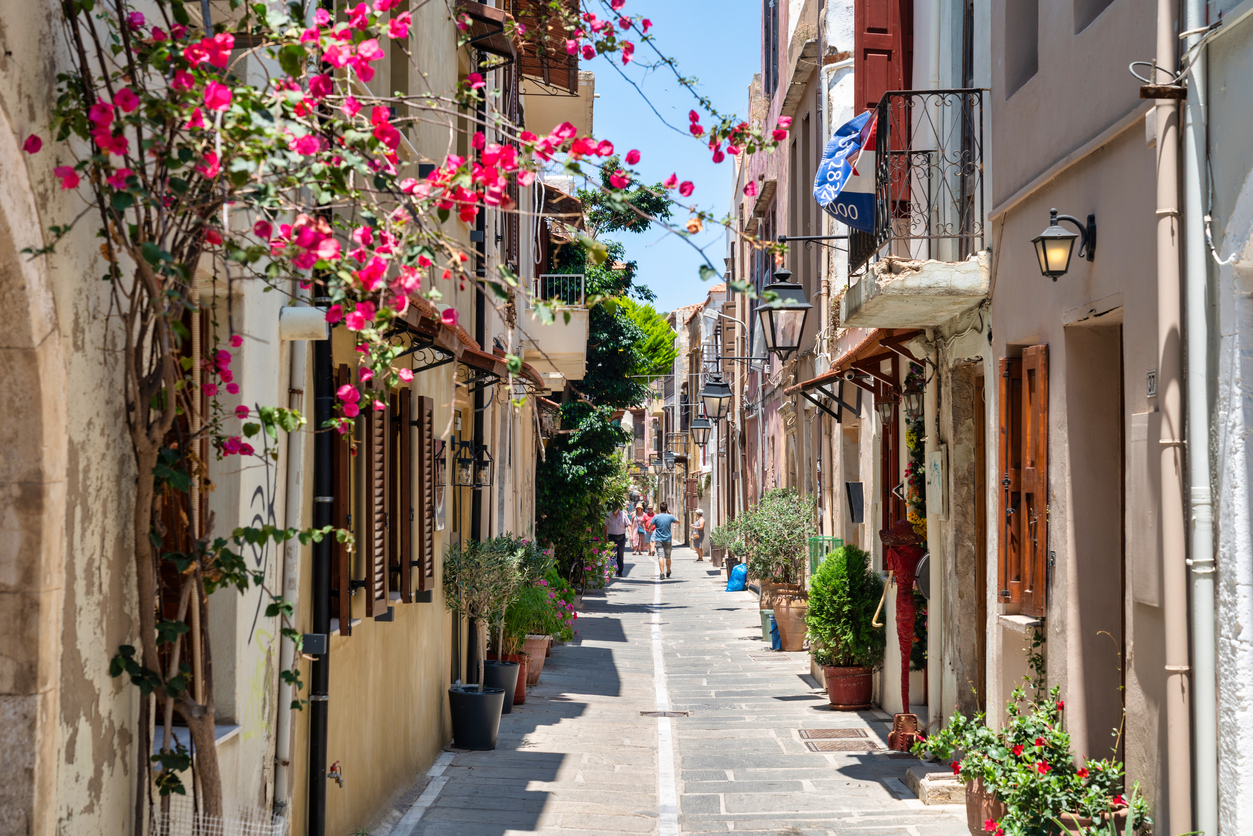

Visa Requirements
To retire in Greece, non-EU citizens need to obtain a residence permit. One of the most popular options is the “Greece Golden Visa,” which requires an investment in property or other financial contributions. Alternatively, retirees can apply for a Financially Independent Person (FIP) visa, which requires proof of sufficient income to sustain themselves without employment in Greece.
Application Process:
- Documentation: Applicants need a valid passport, proof of income or investment, health insurance, and a clean criminal record.
- Financial Requirements: For the FIP visa, retirees must show proof of sufficient financial resources, such as pensions or savings, to support their stay in Greece. The minimum income requirement is typically around €2,000 per month for single applicants, plus additional amounts for dependents.
- Health Insurance: Applicants must have private health insurance valid in Greece, covering both emergency and routine medical care.
- Submission: Applications are submitted to the Greek consulate in the applicant's home country. Processing times can vary but generally take several months.
- Renewal: Residence permits are typically valid for one to five years and can be renewed, provided the applicant continues to meet the requirements.
For more detailed information, visit the official Greek government website on immigration: Greek Ministry of Foreign Affairs - Visas.

Health Insurance
To retire in Greece, non-EU citizens are required to have private health insurance that provides comprehensive coverage. Greece’s healthcare system includes both public and private options, but non-EU retirees must secure private insurance to meet visa requirements.
Choosing the Right Insurance:
When choosing health insurance, ensure it covers hospitalization, emergency services, and routine medical care. Many international insurers offer plans tailored to expatriates in Greece, such as:
After obtaining long-term residency, retirees may access Greece's public healthcare system, which provides affordable, quality care. It's advisable to maintain private insurance for additional coverage and faster access to specialists.
Cost of Living
The cost of living in Greece is relatively moderate compared to other Western European countries, making it an appealing destination for retirees. Housing costs are affordable, especially outside of major urban centers like Athens. Groceries, dining, and healthcare also tend to be reasonably priced.
Monthly Expense Breakdown:
- Housing (Rent for 1-bedroom apartment): €300 - €600
- Utilities: €100 - €150
- Groceries: €200 - €300
- Transportation: €30 - €50
- Healthcare (Insurance): €100 - €200
- Leisure and Entertainment: €100 - €200
Overall, a comfortable monthly budget for a single retiree ranges from €1,000 to €1,500, depending on lifestyle and location.
Population
Greece has a population of approximately 10.4 million people. The population is concentrated in urban areas like Athens and Thessaloniki, while the islands and rural areas have lower densities. Athens, the capital, is the most populous city, with over 3 million residents in its metropolitan area. The slower-paced rural and island regions offer a more relaxed lifestyle, appealing to many retirees.
Transportation
Traveling to Greece from US/Canada
Direct flights from the US and Canada to Greece are available, making it convenient for retirees to travel between these countries. Major airlines operate frequent flights to Athens and other popular destinations. Check the links below for more details on airlines and flight frequency:
- Aegean Airlines - Connects various US locations with Athens.
- Delta Airlines - Offers direct flights from major US cities to Athens.
- Air Canada - Provides direct services from cities like Toronto and Montreal to Athens.
Exploring Greece and Beyond
Greece has a well-developed travel infrastructure, facilitating easy exploration across the country and to neighboring European nations. The integrated network of air, ferry, train, and bus services offers seamless travel possibilities:
- Air Travel: Domestic flights connect major cities and islands, making it easy to explore Greece's diverse regions.
- Ferry Travel: Greece's ferry network is extensive, connecting mainland ports with the numerous islands. Ferries are an excellent way to explore the Aegean and Ionian Seas. Visit Ferryhopper for schedules and tickets.
- Train Travel: The national railway, OSE, connects major cities and offers scenic routes through the countryside.
- Bus Travel: Extensive bus networks cover the mainland and provide economical travel options. The intercity bus service, KTEL, connects most towns and cities.
Additionally, Greece's location allows easy access to other European countries, making it an ideal base for further exploration.
Activities for Retirees in Greece
Greece offers a wide array of activities suitable for retirees, encompassing marina visits, cruises, archaeological tours, culinary experiences, and cultural events.
Marinas and Cruises
Enjoy the beauty of Greece's numerous marinas or take a leisurely cruise along the Aegean Sea. Popular marinas like Flisvos Marina in Athens or Gouvia Marina in Corfu offer high-end facilities and a vibrant local atmosphere. More information can be found on their respective websites: Flisvos Marina and Gouvia Marina.
Archaeological Tours
Greece is home to some of the world's most important archaeological sites, such as the Acropolis, Delphi, and Knossos. Retirees can enjoy guided tours that bring Greece's rich history to life. Visit Visit Greece for more information.
Food and Restaurants
Greece's culinary scene is rich with traditional tavernas, seafood restaurants, and world-renowned Mediterranean cuisine. Explore local dishes like moussaka, souvlaki, and fresh seafood. Learn more about Greece's top restaurants at Michelin Guide.
Museums and Cultural Sites
Delve into Greece's history and culture at its numerous museums. The National Archaeological Museum in Athens and the Heraklion Archaeological Museum in Crete are must-visits. Discover more at National Archaeological Museum and Heraklion Museum.
Events and Festivals
Engage with local culture through various festivals and events, such as traditional music performances, wine festivals, and the Athens and Epidaurus Festival, which features concerts, theatre, and dance.
Safety
Greece is widely regarded as a safe country for both residents and visitors, with crime rates significantly lower than in many other European nations. The country's strong sense of community, cultural emphasis on hospitality, and effective law enforcement contribute to a secure environment, making Greece an attractive destination for retirees.
Comparison with Other Countries
When compared to other European countries, Greece consistently ranks as one of the safer nations. According to international crime indices, Greece has lower rates of violent crime than countries like France, the United Kingdom, and Italy. While petty crimes such as pickpocketing and purse snatching can occur, especially in tourist-heavy areas, overall, Greece offers a peaceful and secure setting for retirees.
Crime Statistics
The most common crimes in Greece are non-violent and include theft, burglary, and vehicle-related crimes. These incidents are more prevalent in larger cities like Athens and Thessaloniki. Violent crimes such as assault and homicide are relatively rare. The Hellenic Police have implemented effective measures to reduce crime rates, including increased patrols and community policing initiatives.
Recommendations for Retirees
Retirees considering Greece as their new home can take several steps to enhance their safety and peace of mind:
- Choose Safe Neighborhoods: In Athens, neighborhoods such as Kolonaki, Glyfada, and Kifisia are known for their safety and high quality of life. On the islands and in smaller towns like Chania (Crete) or Nafplio (Peloponnese), crime rates are even lower, offering tranquil environments.
- Stay Vigilant in Tourist Areas: Be cautious in crowded places where pickpocketing can occur. Keep personal belongings secure and be aware of your surroundings, especially in popular tourist spots like Monastiraki and Plaka in Athens.
- Secure Your Residence: Ensure that your home has proper security measures, such as sturdy locks, alarm systems, and good lighting. Consider living in communities with security personnel or gated access if preferred.
- Engage with the Community: Building relationships with neighbors and local residents can enhance your sense of security. Greeks are known for their friendliness and community spirit, which can provide support and assistance when needed.
- Emergency Services: Familiarize yourself with local emergency numbers. The general emergency number in Greece is 112, which connects you to police, ambulance, and fire services. The direct number for police assistance is 100.
- Stay Informed: Keep up-to-date with local news and advisories, especially regarding any political demonstrations or events that may impact public transportation or city centers.
Natural Disasters
Greece is located in a seismically active region and experiences occasional earthquakes. The country has strict building codes and effective emergency response plans to mitigate risks. Retirees should familiarize themselves with earthquake safety procedures and consider earthquake-resistant housing.
Healthcare and Safety
Access to quality healthcare contributes to overall safety. Greece has a well-established healthcare system with modern facilities and qualified professionals. Emergency medical services are reliable, especially in urban areas and popular islands.
Political Stability
Greece is a stable democracy and a member of the European Union. While political demonstrations and strikes can occur, they are typically peaceful and well-managed by authorities. Retirees can avoid potential disruptions by staying informed and steering clear of protest areas.
Conclusion
Overall, Greece offers a safe and welcoming environment for retirees. By taking common-sense precautions and choosing to live in reputable neighborhoods, retirees can enjoy a high quality of life with peace of mind. The combination of low crime rates, strong community bonds, and a culture that values hospitality makes Greece an ideal destination for those seeking a secure and fulfilling retirement.
Main Locations
Crete
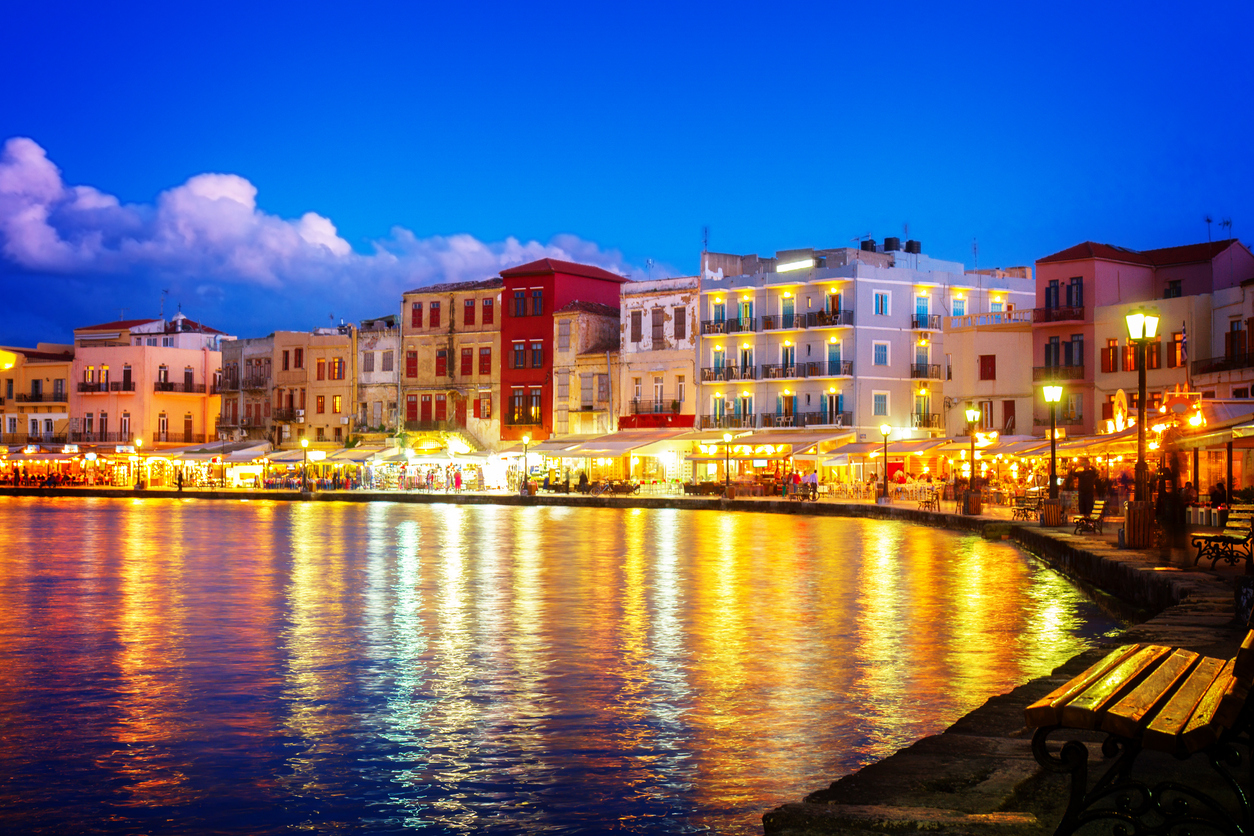

Climate
Crete enjoys a Mediterranean climate with hot summers and mild winters. The average annual temperature is around 19-21°C (66-70°F), ideal for retirees seeking warmth year-round.
Healthcare
Crete has excellent healthcare facilities, including public and private hospitals. Major hospitals include the University Hospital in Heraklion and Chania General Hospital, offering quality care with many English-speaking staff.
Main Towns
-
Chania
- Pros: Rich in history and culture, beautiful Venetian harbor, and excellent healthcare facilities.
- Cons: Can be crowded during the tourist season.
-
Heraklion
- Pros: Lively city with modern amenities, museums, and good transport links.
- Cons: Busy urban environment, less tranquil compared to other towns.
-
Rethymno
- Pros: Charming old town, beautiful beaches, and a relaxed atmosphere.
- Cons: Smaller and quieter than Chania or Heraklion.
Summary
Crete offers a mix of vibrant city life in Heraklion and relaxed coastal charm in Chania and Rethymno. The island's mild climate and excellent healthcare make it a top choice for retirees.
Athens
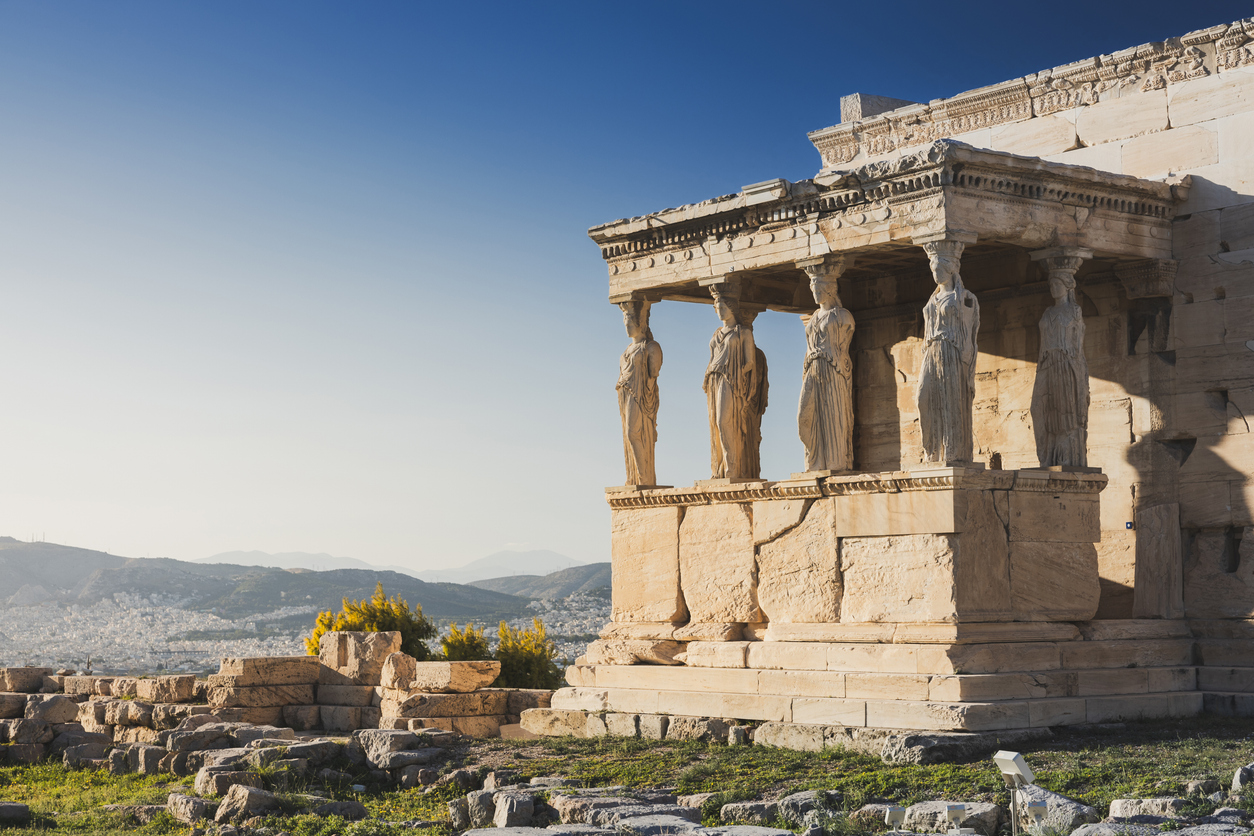
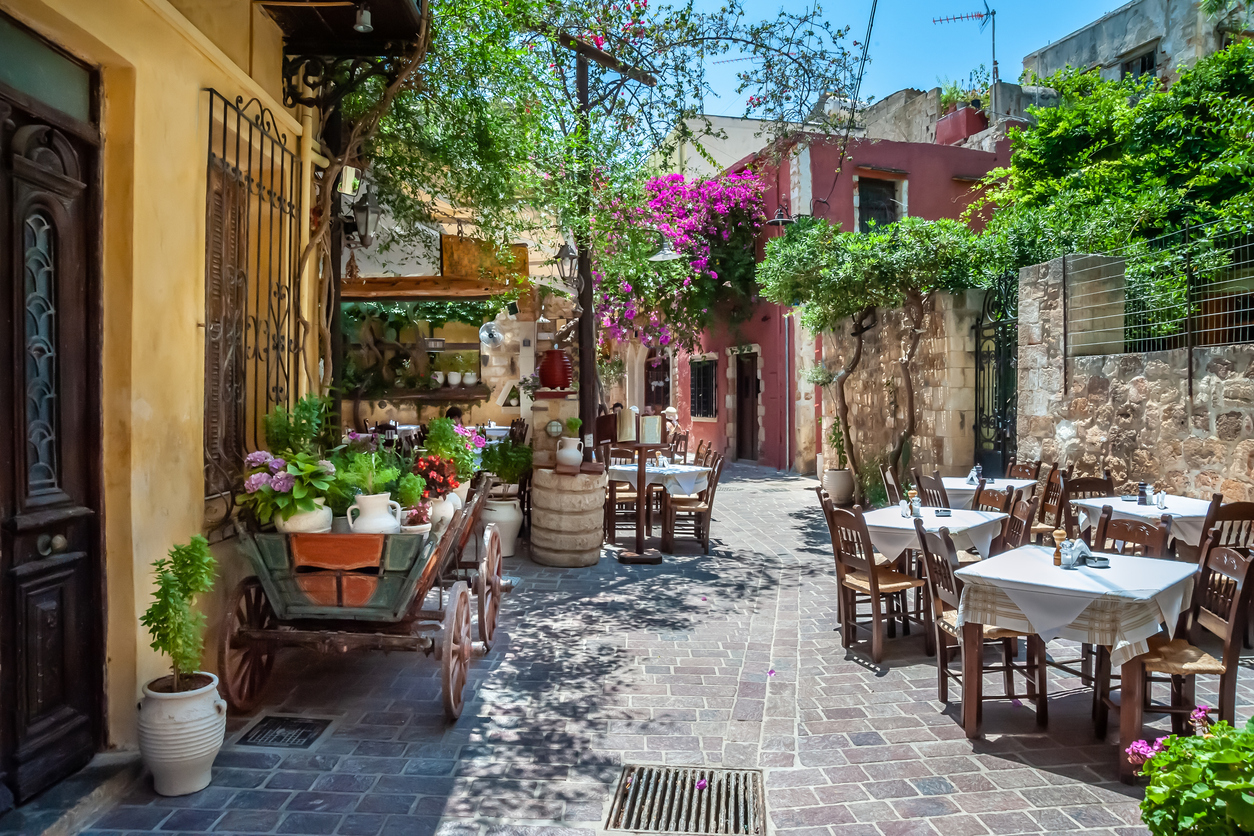
Climate
Athens enjoys a Mediterranean climate with hot, dry summers and mild, wet winters. The average annual temperature is around 18°C (64°F), offering a pleasant environment for retirees.
Healthcare
Athens has some of the best healthcare facilities in Greece, with numerous public and private hospitals such as Evangelismos Hospital and Hygeia Hospital, providing high-quality care.
Main Neighborhoods
-
Kolonaki
- Pros: Upscale neighborhood with luxury amenities, cafes, and cultural attractions.
- Cons: Higher cost of living compared to other neighborhoods in Athens.
-
Plaka
- Pros: Historic area with charming streets, traditional tavernas, and proximity to major attractions.
- Cons: Crowded with tourists, especially during peak seasons.
-
Glyfada
- Pros: Coastal suburb with beautiful beaches, shopping centers, and a relaxed atmosphere.
- Cons: Farther from the city center.
Summary
Athens provides a vibrant mix of history, culture, and modern living. Neighborhoods like Kolonaki offer luxury, while Glyfada provides coastal tranquility, making Athens a diverse choice for retirees.
Peloponnese
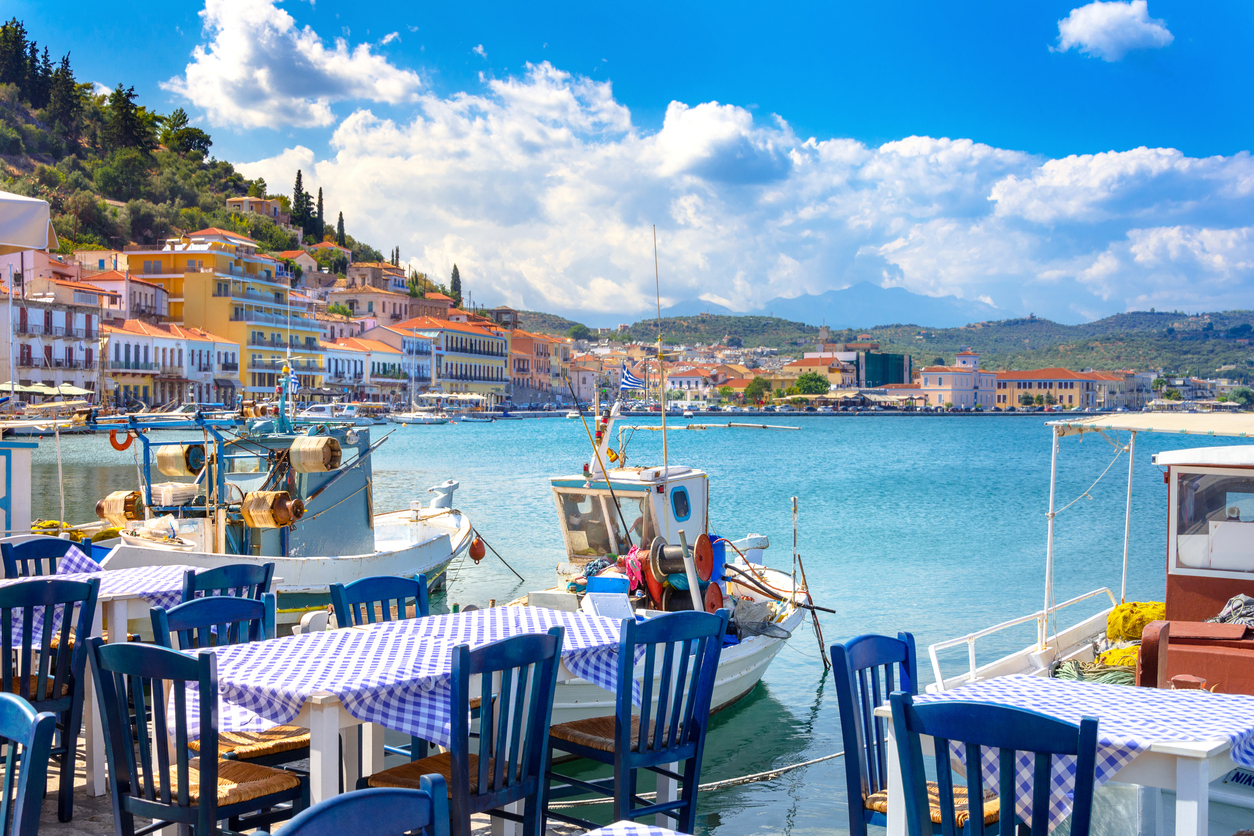
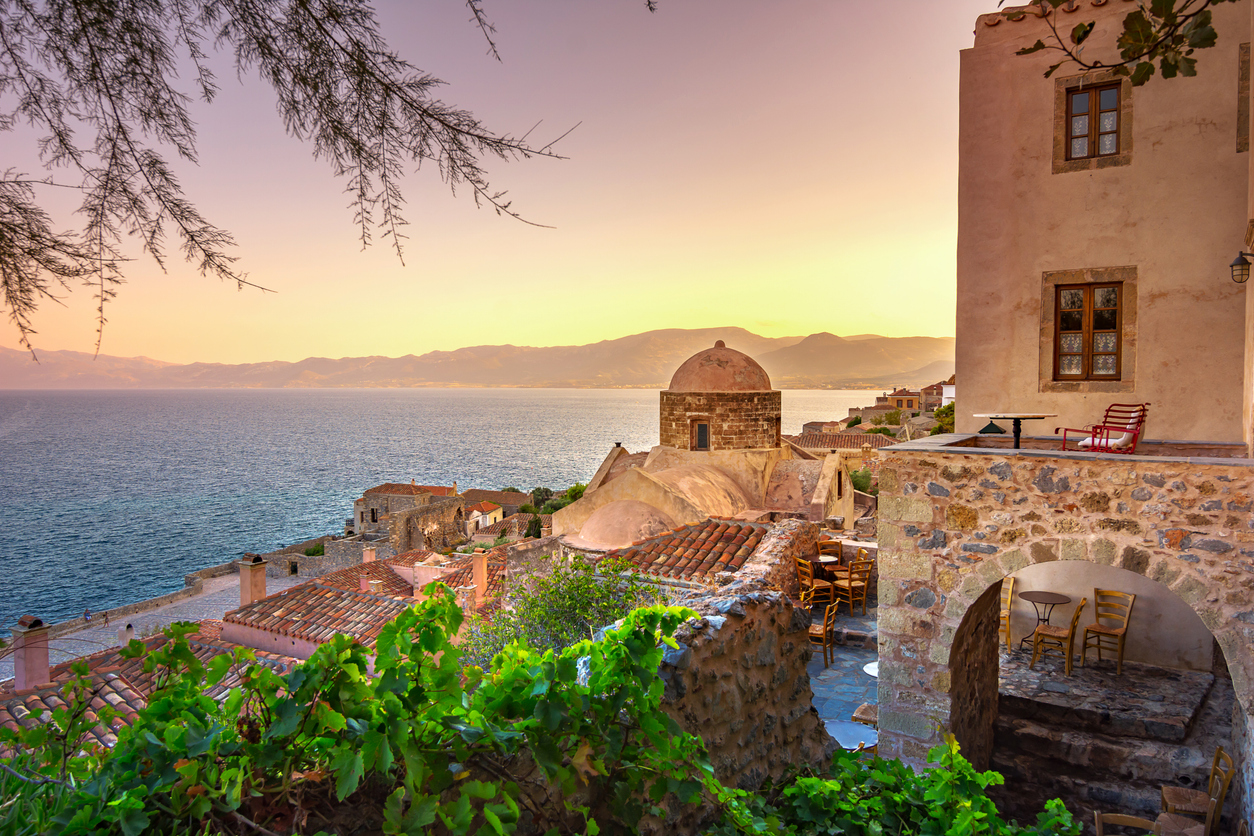
Climate
The Peloponnese enjoys a typical Mediterranean climate with warm summers and mild winters. The average annual temperature is around 17°C (63°F), perfect for retirees seeking comfort year-round.
Healthcare
Healthcare in the Peloponnese is accessible, with public hospitals in major towns like Kalamata and private clinics providing good services. Many healthcare providers speak English, catering to expatriates.
Main Towns
-
Kalamata
- Pros: Beautiful coastal town with modern amenities, a relaxed pace of life, and a vibrant cultural scene.
- Cons: Smaller than major cities, with fewer high-end services.
-
Nafplio
- Pros: Picturesque town with a rich history, charming old town, and seaside views. Nafplio is known for its friendly community.
- Cons: Limited public transportation options.
-
Patras
- Pros: Lively city with a mix of modern and traditional culture, major port, and good connectivity to the rest of Greece.
- Cons: Busy compared to other Peloponnesian towns.
Summary
The Peloponnese offers a relaxed lifestyle with a mix of beautiful coastal and inland towns. Kalamata and Nafplio are ideal for those seeking a slower pace of life, while Patras provides more urban amenities.

